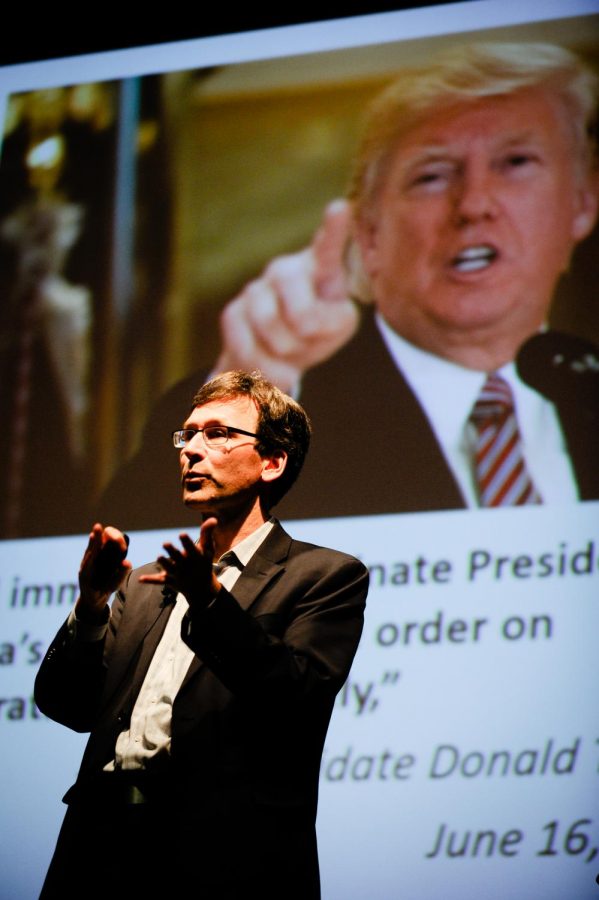Attorney General comes to CWU
Bob Ferguson discussed how he combatted Trump’s travel ban.
April 12, 2018
After a lawsuit filed by Washington Attorney general was upheld continuing deportation protections for dreamers in Washington, letters of gratitude flooded the Attorney General’s office.
One letter, from a girl the same age as Attorney General Bob Ferguson’s daughter Katie, thanked him for his service. In the letter the girl wrote, “f you did not stand up, I would not be here.”
This is the kind of work the Attorney General’s office has been doing in the last year.
About 70 students, faculty and members of the media gathered in the SURC Theatre Tuesday evening to hear how Ferguson is serving Washington residents. Ferguson spoke of two major lawsuits in the past year. The first, the executive order travel ban from President Trump; the second, the deportation protections for dreamers.
Students attended for various reasons, some for extra credit, others because they support the work the Attorney General’s office does.
“I was going to come even before my class offered extra credit,” said Junior Law and Justice Major Jordan Bruce. “I just like it when politicians come to Ellensburg… you get a view of what’s going on.”
Political science major Nancy Canales attended because of Ferguson’s strong influence on her. Inspired by what his office has accomplished, Canales wishes to attend law school after graduating CWU. Canales has participated in DACA protests in the past with United We Dream, a youth-led group that fights for dreamers.
Ferguson’s office employs about 600 professional staff members and he directs about 600 attorneys across the state. Washington was the first state to fight the travel ban. The Attorney General’s office has filed 24 lawsuits against the Trump administration in the last year; they haven’t lost a case yet.
“Shane knows [that] I’m not one to keep score, but we’re five-and-zero, Mr. President,” Ferguson said.
Of the 24 filed lawsuits, one regarded the transgender military ban, 12 on environmental cases, two on the affordable care act and one on net neutrality.
The office decides which lawsuits to file based on three key factors. The first factor is how Washington residents are affected; the second, the strength of the legal standing; and the third, the legal arguments available.
The first major lawsuit filed against the Trump administration regarding the travel ban was filed the Monday following the executive order signing on Friday evening. Ferguson and his team knew the president was considering the ban from his words on the campaign trail. Ferguson and his team had to work quickly; the executive order went into effect immediately.
At first, Washington stood alone as the only state to challenge the travel ban. Many in the national media believed any challenge to the travel ban on a state level would fail. Ferguson took the calculated risk.
“The point of the game is to win. Yes, I realize that I might lose, it might even increase my chances of losing, but It’s definitely increasing my chances of winning,” Ferguson said. “So, this is not the legal term, but ‘screw it. I’m doing it.’”
The lawsuit victory made national headlines. Anderson Cooper’s staff called Ferguson’s mother trying to reach him for an interview.
The second major lawsuit Ferguson’s office filed regarded deportation protection for dreamers. Sept. 5, 2017, the Trump administration rescinded DACA, removing deportation protections for dreamers. Dreamers were deported to countries they were unfamiliar with. Ferguson’s team filed their lawsuit the next day. Like the travel ban lawsuit, they were prepared.
The event concluded with a question and answer session. Audience members asked Ferguson about environmental issues affecting Washington, if conservative views are being muted and if Trump administration policies are reversible.
One audience member to come to the microphone, an older male Trump supporter, was happy Ferguson supports the the supreme court. However, he did not agree with Ferguson challenging presidential authority. The man often interrupted Ferguson and eventually left frustrated.
“You just keep talking and talking,” the man said.



